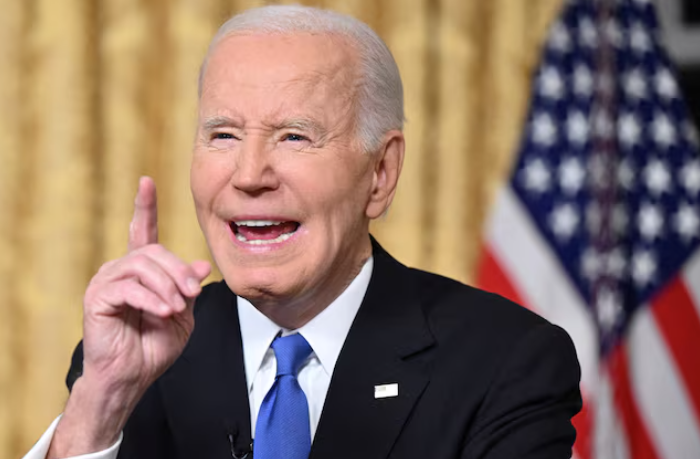
Summary
- Probe questions Biden’s competence and use of autopen
- Presidents have broad authority to issue pardons
WASHINGTON, June 2 (Reuters) – A senior official in former President Donald Trump’s Justice Department has informed staff that he’s been ordered to investigate clemency decisions made by President Joe Biden in the final days of his term including pardons granted to members of his family and death row inmates.
Ed Martin, the DOJ’s pardon attorney, stated in an internal email (obtained by Reuters) that the probe is examining whether President Biden was mentally competent when issuing the pardons, and whether others may have manipulated the process possibly using an AutoPen or similar methods to authorize documents on his behalf.
A senior official in the U.S. Justice Department under former President Donald Trump has been directed to investigate clemency decisions made by President Joe Biden during the final weeks of his term including controversial pardons of family members and death row inmates.
In an internal email seen by Reuters, Ed Martin, the DOJ’s pardon attorney, revealed the investigation focuses on whether President Biden was mentally competent when issuing the pardons and whether others may have exploited him, possibly using an autopen, a device that can automatically sign documents. Martin noted that the probe seeks to determine if Biden’s signature was truly his own or if he had full awareness of his clemency actions.
While there is no evidence that Biden used an autopen to authorize pardons, Trump and his supporters have repeatedly suggested without proof that such use would invalidate official actions and signal diminished awareness on Biden’s part.
The investigation centers on preemptive pardons granted to five of Biden’s close family members siblings James Biden, Frank Biden, and Valerie Biden Owens, and their spouses John Owens and Sara Biden issued on January 20, 2025, shortly before Biden handed over the presidency to Trump. The president had justified the move as a shield against “future politically motivated investigations.”
In addition, the probe examines Biden’s clemency for 37 federal death row inmates, whose sentences were commuted to life imprisonment.
On December 1, 2024, Biden also pardoned his son, Hunter Biden, who had pleaded guilty to tax violations and was later convicted on firearms-related charges. Martin’s email did not clarify which family pardons are being specifically reviewed, nor did it reveal who authorized him to begin the investigation.
The Justice Department and White House representatives have not yet issued public comments.
Under the U.S. Constitution, presidents hold broad authority to grant pardons and commutations for federal crimes. Notably, Donald Trump himself made sweeping use of this power including a blanket clemency granted on January 20, 2025, to nearly 1,600 of his supporters charged in connection with the January 6 Capitol riot, an effort to overturn the results of the 2020 election.
WASHINGTON, June 2 (Reuters) — Ed Martin, the Justice Department official leading the investigation into President Joe Biden’s final pardons, is no stranger to controversy. Martin previously served as interim U.S. Attorney for Washington, D.C., though his permanent nomination was ultimately blocked in the Senate.
Speaking at a press conference on May 13, Martin acknowledged that the presidential pardon power is “plenary” meaning absolute and even stated that the use of an autopen to issue pardons “isn’t necessarily a problem.” Despite this, he maintained that the pardons made by Biden still deserved scrutiny.
“If you use the autopen for pardon power, I don’t think that that’s necessarily a problem,” Martin said, while reiterating the importance of reviewing the context and process behind the decisions.
The investigation, however, appears to be politically charged, aiming to intensify public discourse around President Biden’s mental fitness a topic that has gained momentum following Biden’s cancer diagnosis and revelations from a recent book detailing Democratic Party concerns about his health in 2024.
Those concerns were further amplified after Biden, now 82, delivered a widely criticized performance during a presidential debate last year. He subsequently withdrew from the 2024 reelection race, citing a need to “pass the torch.” Biden was the oldest individual to serve as president in U.S. history; Donald Trump, now 78, is the second oldest.
Despite the ongoing investigation, President Biden’s top aides have firmly rejected speculation about his decision-making ability, affirming that he remained fully capable of executing presidential duties, including issuing pardons.
“President Biden made these decisions himself, with full awareness and intent,” one senior aide stated, pushing back against narratives questioning his cognitive health.
Importantly, no credible evidence has surfaced indicating that Biden was unaware of or did not intend to issue the pardons. Additionally, the legal basis for using an autopen in presidential actions is not without precedent. A 2005 Justice Department memo concluded that it is legally permissible for a subordinate to employ an autopen to affix the president’s signature, provided the president authorizes the action.
By Andrew Goudsward and Sarah N. Lynch | Edited by Scott Malone


